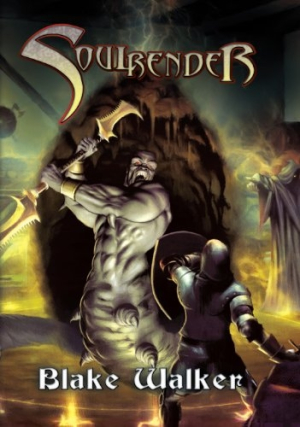Soulrender
Blake Walker’s debut novel takes the reader down the roads that Tolkien built, makes a left turn into Robert Howard’s lands, and goes straight on into the world of a young warrior named Katrina, who faces the greatest challenge of her life.
Trained by her parents to be a skilled warrior and to control and refine her mentalism abilities (used primarily for combat), Katrina and her friends set out on a journey to the abandoned elven city of Rael Millenas. The city ruins hold many small treasures which the travelers can bring home for trade or sale; such journeys combine an adulthood rite with a resupply mission.
The trek to Rael Millenas includes many real dangers, and the survival of each traveler depends on teamwork. Katrina and her friends manage to meet the challenges of their journey and reach the city, where they encounter something that is far stronger than all of them—except Katrina. She unleashes a power she didn’t know she had until she most needed it.
Upon returning to her village and relating the journey’s events, she learns that she is a soulrender, with the ability to bring down entire cities at once. Because of this, the village elders sadly tell her that she must leave. She needs training that the elders can’t provide, so she must find the bone tower and its denizens, who can teach her what she needs to know. Katrina meets new companions on the way to the bone tower, all of whom are also soulrenders. They will all be tested to their breaking points, for their enemies are great in strength and bent on destroying all the soulrenders have ever known.
Walker has categorized his novel as one definitely for adults, and he’s not kidding. Soulrender was born out of a desire for a different kind of fantasy world, one where the heroes (already adults) have all their battle skills before the adventure begins. Here, there are many gods who can be more pesky than divine, and the bad guys are very, very bad. This is not a novel to be read by children.
Soulrender uses what could be called the Tolkien-standard setting, character types, and story (European-based) as a jumping-off point. Walker combines less-traditional characters with a story that hides its twists and turns very well, and the villains are far nastier than anything dreamt up before this. The battles, which are brilliantly written, never have assured outcomes, and several supporting characters don’t make it to the end of the story.
Walker’s novel has its flaws: too-detailed descriptions, verb tense errors, and italicized onomatopoeia are scattered throughout the text. However, the character development, story lines, settings, and the interwoven themes of guilt and duty far outweigh the errors.
Fantasy fans who are tired of rubber-stamped fantasy characters and stories should appreciate this novel. It is the first of a planned series.
Reviewed by
J. G. Stinson
Disclosure: This article is not an endorsement, but a review. The publisher of this book provided free copies of the book and paid a small fee to have their book reviewed by a professional reviewer. Foreword Reviews and Clarion Reviews make no guarantee that the publisher will receive a positive review. Foreword Magazine, Inc. is disclosing this in accordance with the Federal Trade Commission’s 16 CFR, Part 255.

